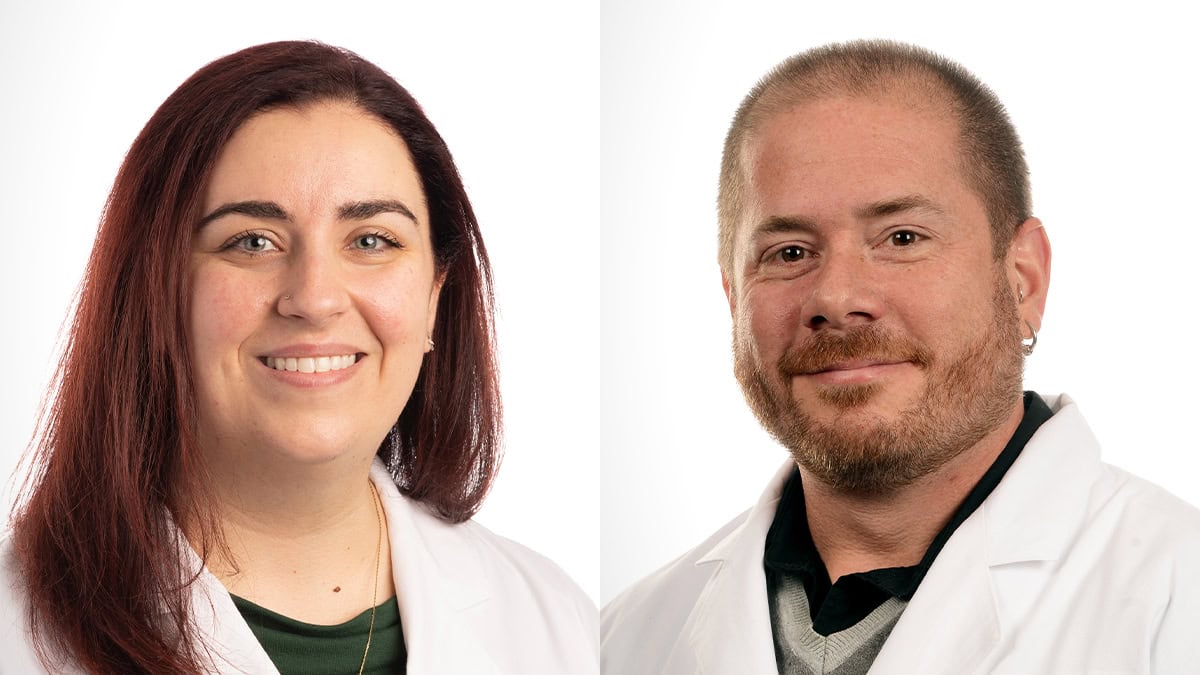View Larger Image

Melissa Zielinski, Ph.D., and William Fantegrossi, Ph.D.
UAMS’ Addiction Training Program Renewed for Five More Years
| LITTLE ROCK — The University of Arkansas for Medical Sciences’ Addiction Research Training Program was recently awarded $2.4 million from the National Institute on Drug Abuse (NIDA) to renew the program for another five years.
The award marks the third time the program has been renewed by NIDA since it was launched at UAMS in 2009. The program has received a total of $5.8 million in National Institutes of Health funding since its inception. The award provides stipends as well as tuition and training-related and travel expenses for eight to 12 ongoing pre- and postdoctoral trainees in the area of addiction research. It also supports a summer program for four medical students to train in addiction research annually.
In total, the program has supported the development of 104 trainees committed to addiction-related research in 15 years. All trainees who have joined the program have completed it. Many of those trainees have gone on to be appointed to faculty positions at academic facilities, including 12 faculty at UAMS. Others have gone on to serve their communities as medical practitioners or to apply the research skills they gained in nonprofits or private industry positions.
“This award represents a critical investment in growing the addiction research workforce in our state and nationally, and we are proud that NIDA continues to see our program as worthy of that investment,” said Melissa Zielinski, Ph.D., an associate professor in the Department of Psychiatry and co-director of the Addiction Research Training Program along with William Fantegrossi, Ph.D., a professor in the Department of Pharmacology and Toxicology.
The training program is unique in that it relies on a connected network of 17 faculty members from six departments at UAMS — Psychiatry, Pharmacology and Toxicology, and Neurobiology and Developmental Neuroscience in the College of Medicine; Pharmacy Evaluation and Practice, and Pharmaceutical Sciences in the College of Pharmacy; and Health Behavior and Health Education in the Fay W. Boozman College of Public Health — to mentor the young research scientists. The program is further unique in its simultaneous, multilevel training of predoctoral students, postdoctoral fellows, medical students and Psychiatry residents.
“Addiction and substance use disorders challenge public health on several fronts, and researchers require broad-based, interdisciplinary training to effectively address these problems. Our program provides a bird’s eye view of addiction science to better prepare our trainees to translate their research findings into improved treatments for those struggling with drug-related disorders,” said Fantegrossi.
UAMS is the state’s only health sciences university, with colleges of Medicine, Nursing, Pharmacy, Health Professions and Public Health; a graduate school; a hospital; a main campus in Little Rock; a Northwest Arkansas regional campus in Fayetteville; a statewide network of regional campuses; and eight institutes: the Winthrop P. Rockefeller Cancer Institute, Jackson T. Stephens Spine & Neurosciences Institute, Harvey & Bernice Jones Eye Institute, Psychiatric Research Institute, Donald W. Reynolds Institute on Aging, Translational Research Institute, Institute for Digital Health & Innovation and the Institute for Community Health Innovation. UAMS includes UAMS Health, a statewide health system that encompasses all of UAMS’ clinical enterprise. UAMS is the only adult Level 1 trauma center in the state. UAMS has 3,485 students, 915 medical residents and fellows, and seven dental residents. It is the state’s largest public employer with more than 11,000 employees, including 1,200 physicians who provide care to patients at UAMS, its regional campuses, Arkansas Children’s, the VA Medical Center and Baptist Health. Visit www.uams.edu or uamshealth.com. Find us on Facebook, X (formerly Twitter), YouTube or Instagram.###